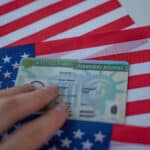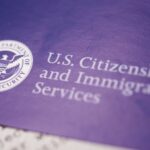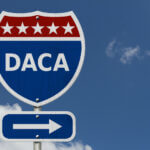Contents
President Donald Trump signed a new executive order on March 6th restricting travel to the U.S. from six predominantly Muslim Middle Eastern and North African nations. It is a partial reinstatement of the first travel ban that was blocked in February by a federal court. As President Trump’s newest executive order establishing a travel ban was scheduled to take effect on March 16th, immigration attorneys were mounting a last-minute effort to ask federal courts to stop it from taking effect.
On March 15th, federal judges in Hawaii and Maryland heard arguments on the constitutionality of President Trump’s revised executive order, which not only temporarily halts the issuing of new visas to foreign nationals from six Muslim-majority nations but also suspends the U.S. refugee program and reduces refugee admissions to the U.S. this fiscal year from 110,000 to 50,000.
The Immigration and Nationality Act of 1965 prohibits discrimination on the basis of nationality, place of birth, place of residence, gender, or race when visas are issued.
Activist groups including the American Civil Liberties Union have called President Trump’s executive orders discriminatory, but spokespersons for the Trump Administration counter that charge by saying that the executive orders seek to protect the United States from terrorism. The revised executive order, according to the Department of Homeland Security, “allows for the proper review and establishment of standards to prevent terrorist or criminal infiltration by foreign nationals.”
WHAT ARE THE DETAILS OF THE NEW EXECUTIVE ORDER?
Like the president’s original order, the new executive order “imposes a 90-day suspension of entry” to individuals from Sudan, Syria, Iran, Libya, Somalia, and Yemen, but this time around the executive order excludes travelers who already have valid visas. Another difference – the revised travel ban, unlike the first ban, does not affect individuals arriving in the United States from Iraq. Iraq was excluded from the new travel ban, according to the Department of Homeland Security, because the Iraqi government agreed to “increase cooperation” with U.S. authorities.
Chaos surrounded President Trump’s first travel ban, which was issued in January during his hectic first week as president. The ban sparked protests at several U.S. airports and in cities across the nation and around the world. That first executive order – which impacted even those travelers with valid visas from all seven nations – generated a number of legal challenges, including the lawsuit by the state of Washington that led to a February 3rd injunction which halted implementation of the order due to concerns regarding its constitutionality.
Another point distinguishing the first travel ban from the second is that this second executive order does not apply to individuals possessing green cards or to dual nationals, travelers, and those previously approved for refugee or asylum status. However, the order temporarily suspends refugee resettlement – for 120 days – while the Department of Homeland Security reviews the “vetting” process “to ensure refugees admitted in the future do not pose a security risk to the United States.”
HOW DOES THE NEW ORDER IMPACT REFUGEE RESETTLEMENT?
President Trump has already restricted refugee admissions to 50,000 this year; last year under President Obama, approximately 110,000 immigrants were admitted into the U.S. as refugees. As of early March, according to the Department of State, more than 37,000 refugees had already been admitted into the United States this fiscal year, which ends on September 30th. That restriction leaves tens of thousands of refugees – and the groups and attorneys who help them – with no clear options.
“That makes their ability to carry out their mission nearly impossible,” according to Melissa Keaney, an attorney with the National Immigration Law Center, which argued on March 15th against the travel ban in a Maryland federal court. Those who work resettling immigrants “have to basically scramble to try to find safe housing for individuals who are in very dangerous and precarious situations,” Ms. Keaney told the Washington Post.
Neither of President Trump’s executive orders regarding travel would have stopped any of the recent terror attacks in the United States including 9/11, the Pulse nightclub massacre, the Boston Marathon bombing, or the shootings in San Bernardino. Fifteen of the nineteen 9/11 hijackers were citizens of Saudi Arabia, and the others were from the United Arab Emirates, Egypt, and Lebanon. U.S. citizens – and people who legally entered the United States – have been behind the other terror attacks.
WHAT IF YOUR VISA WAS CANCELLED BY THE FIRST EXECUTIVE ORDER?
Currently, the Department of Homeland Security is conducting a ninety-day review of all countries to confirm that those nations are providing the U.S. with accurate data about individuals who apply for visas. Homeland Security officials said that any of the six nations could be removed from the travel ban at the end of their review and that other nations could conceivably be added. Those whose visas were canceled by the first executive order will not be required to obtain a new visa. Travelers with no other admissibility issues will be given an I-193 “Application for Waiver of Passport and/or Visa” when they arrive in the United States.
If you or someone you love is struggling with any legal matter related to immigration, the smart move is to meet at once with an immigration attorney who can evaluate your personal circumstances and then work on your behalf to resolve the matter successfully. If you are an employer trying to bring workers into the U.S., if you are trying to reunite your family, or if you have any legal concerns or questions regarding the travel ban or any other aspect of immigration law, an experienced Las Vegas immigration attorney can provide the sound legal advice and comprehensive legal services you need.
Sirine Shebaya, a civil rights attorney with the Dulles Justice Coalition, told the Washington Post that the organization is preparing for more confusion and chaos at airports if the new executive order goes into effect as scheduled on March 16th.
By the time you read this, and as the courts hand down rulings and those rulings are appealed, the legal situation may change again. Until the United States Supreme Court hears all of the arguments and issues a definitive ruling on the executive orders, those who are impacted by the travel ban should seek out and adhere to the advice of an experienced Las Vegas immigration attorney.






